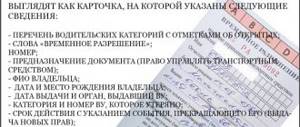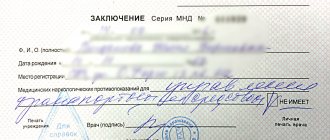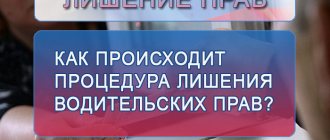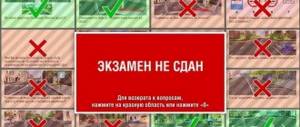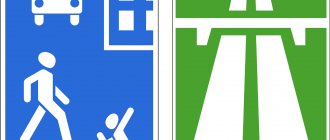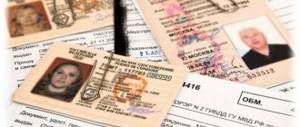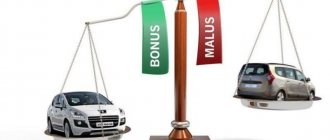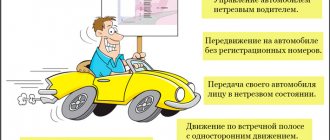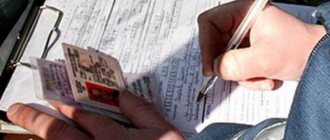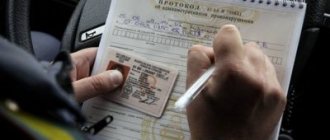Losing a driver's license in modern realities does not seem such a difficult task. Confiscation of rights by court decision occurs not only due to driving while under the influence of alcohol or drugs, but also for refusal to undergo a medical examination at the request of a traffic police inspector.
Deprivation of rights also occurs for many gross violations of the Traffic Rules - driving into the oncoming lane, driving through a red traffic light, driving without license plates, using illegal technical devices, significantly exceeding the speed limit, and much more. What is the punishment for driving a car without a license if the driver has already been deprived of it once and the period of deprivation has not yet expired? Should I ignore the court decision and drive without a license?
Responsibility for driving without a license if they are deprived
The answer to the question of what liability a driver faces for driving a vehicle without a license (in case of deprivation) is found in Part 2 of Art. 12.7 Code of Administrative Offenses of the Russian Federation:
- an administrative fine in the amount of 30 thousand rubles;
- administrative arrest for up to 15 days;
- compulsory work for a period of 100 to 200 hours.
Driving without a license, when the driver has never received one, will result in a fine of 5 to 15 thousand rubles (Part 1 of Article 12.7 of the Administrative Code). If the owner of a car transfers the right to drive it to a person who obviously does not have a license or who was previously deprived of this right, then he will have to pay a fixed fine of 30 thousand rubles (Part 3 of Article 12.7 of the Administrative Code).
If a driver deprived of his license is caught driving a car in 2018, his vehicle will be forcibly detained and sent to a parking lot. The same will happen if the driver has never had a license.
Removal from driving a vehicle and sending the car to an impound lot are always fraught with additional financial costs for the offender, in addition to paying the fine. We are talking about paying for tow truck services and vehicle idle time in a temporary parking lot.
This can only be avoided if another person who has a driver’s license and is included in the MTPL insurance (friend, relative) quickly arrives at the place of detention. Then this person will be able to drive the car to the garage, bypassing the unpleasant procedure of evacuation to the impound lot (Part 1.1 of Article 27.13 of the Administrative Code).
If a driver is caught driving without a license after being revoked, it would not be a good idea to try to deceive the traffic inspector and tell him that the license was lost, stolen, or forgotten at home or at work. It is now very easy to establish the fact of deprivation of rights using the traffic police online databases, to which almost all State Traffic Inspectorate employees have access. The deception will quickly be revealed and will only aggravate the punishment.
What to do if you have already been deprived of your driver's license?
Honest and legal ways to drive
What should a driver do if his license has been deprived and even his lawyer admitted that he cannot avoid punishment? It happens that it is very difficult to get along without a car. There is a solution to this issue and it is not at all necessary to break the law.
- Option 1 – use a taxi. This way you can relax and get to your destination on time. There will even be time to think about how to drive in the future without breaking traffic rules.
- Option 2 – try to delay the sentence as much as possible:
- On the same day when the protocol is drawn up, the violator applies to the Federal Court with a complaint. Having notified the magistrate, who will consider the issue of deprivation of rights, about this. This will provide a full month of legal driving.
- The next step is to persuade your manager at the place of employment to send you on a business trip. For this reason, the Federal Court may postpone the trial for another couple of weeks.
- The offender’s lawyer, who is going to fight for the rights of his client to the end, draws up petitions. They indicate a request that all witnesses to the violation be present at the court hearing. Including the inspector who drew up the protocol. If he is not at the meeting, the proceedings may be postponed for a certain time.
- You can try to find some time by challenging one of the participants in the proceedings (but in reality this is rarely possible).
- In order for the case to be brought back to the Magistrates' Court, time will also be required.
- Option 3. The third option can be called seasonal. This is purchasing a scooter. If the motorcycle has an engine capacity of less than 50 cubic meters, then you do not need to obtain a license. Of course, a scooter is not comparable to a full-fledged car, but it will allow you to avoid public transport and not be late.
Sooner or later, rights will have to be given up if a citizen has committed such an offense. But the above methods are legal and allow you to drive vehicles without claims from the authorities.
Tips for those who want to quickly get behind the wheel of a car
There can be only one trick to getting back behind the wheel of a car and avoiding punishment: if a citizen does not agree with the deprivation of his rights, he needs to hire a good lawyer and challenge the court’s decision. It is highly recommended not to drive without a driver's license.
If a person tries to find loopholes, then this already indicates that the offender is not going to change behavior and comply with the law when driving. In this case, everything could end sadly, even with a pedestrian being hit. This is no longer an administrative, but a criminal offense. You could very well end up in jail for this.
You should not be too zealous, delaying the court hearing . Yes, this allows you to increase the period of legal driving, but still the case will end with a verdict (read about how the court hearing on deprivation of a driver’s license takes place and how to behave here). The driver thus increases the period of deprivation of his license. You need to remember this even if the document was not submitted to the State Traffic Inspectorate on time.
The countdown of the sentence will begin not from the moment the court decision is made, but from the day the driver’s license is handed over to the traffic police.
Fine, arrest or forced labor?
Administrative arrest for driving without a license after its withdrawal is the most severe disciplinary measure. Therefore, this measure is prescribed in exceptional cases and in relation to only the most persistent violators of the Traffic Rules. In accordance with part 2 of Art. 3.9 of the Code of Administrative Offenses of the Russian Federation, administrative arrest in 2021 is not applicable to the following categories of citizens:
- pregnant women and women with children under 14 years of age;
- minor citizens;
- disabled people of the first two groups;
- military personnel and citizens called up for military training;
- persons with special ranks of employees of the Investigative Committee, Department of Internal Affairs, institutions of the penal system, national guard troops, as well as the fire service and various customs authorities.
The severity of liability for driving without a license largely depends on the presence of mitigating or aggravating circumstances. It’s one thing when a driver is accidentally caught driving a car without a license (as part of a routine document check). And it’s another matter if this happened as a result of an investigation into the circumstances of an accident that occurred due to the fault of such a driver. In the latter case, he will face punishment under two articles at once - for driving without documents and for violating traffic rules.
The period of administrative arrest also includes the period of administrative detention, which can last from 3 to 48 hours. The period of detention is counted either from the moment the driver is delivered to the traffic police department, or from the moment he sobers up (if he was detained while intoxicated).
The procedure for obtaining rights after deprivation
The procedure for returning the driver's license upon expiration of the punishment period occurs in several stages. Initially, the driver must collect all the necessary papers and submit them to the relevant authorities. After this, he will be assigned a second exam at a driving school, based on the results of which the traffic police officers will make a verdict: to give the person his certificate or not.
If there are no problems with knowledge of traffic rules, then the driver will be able to receive his license after deprivation only a few days after paying the single state fee. At the same time, he will additionally be assigned a mandatory medical examination, where the doctor can decide to register the citizen with drug treatment (in the event of revocation of his license for driving while intoxicated). Such a note on the certificate will significantly complicate the procedure for returning the driver's license.
Where to contact
Rights should be taken away at the end of the period of deprivation at the traffic police department to which they were sent by court decision. To do this, the driver just needs to write a corresponding application and attach a package of prepared documents to it. But you need to go for your crust strictly after:
- Repeated passing of the theoretical exam at a driving school (for pedestrians who have lost their driving license as a result of a serious violation, special tickets are issued that do not contain questions on medical, psychological and legal topics);
- Passing a medical examination (the list of doctors remains the same as during the initial driving test).
In other cases, traffic police officers will have every right to refuse a citizen’s application.
At the same time, if a person has moved to another city or region, and he is physically unable to pick up his document at the established office, he can contact the local traffic police department with a written request to forward the document. On average, this process takes about one week. Depending on the distance between government agencies, this period may significantly increase or decrease.
Required documents
When the driver goes through all the necessary authorities (driving school and hospital), he only has one step left before his license is restored after deprivation: submit a package of documents for consideration by the traffic police. This list includes the following:
- An application drawn up in accordance with a single form (in addition to the offender’s full name, it also indicates his passport details, including his place of registration);
- Conclusion of a full medical examination (you can find out the list of doctors for examination at the reception desk);
- A copy of the court decision, which indicates information about the timing and reason for deprivation of the driver's license;
- Protocol on the voluntary transfer of a driver’s license to traffic police officers (drawn up at the scene of the violation);
- Receipt of payment of the mandatory duty;
- Checks evidencing coverage of fines (if the driver was deprived of his license as a result of evading the payment of alimony, a certificate of repayment of the mentioned debt is added to the listed list of documents);
- A copy of the applicant's passport (only the front side with the photo and the registration page are required).
This list of documents is approved by the law of the Russian Federation, and government officials have no right to demand more from a citizen. Otherwise, a complaint can be filed against them.
Exam on traffic rules theory
Restoration of rights after deprivation occurs with a second retake of the theory. But such a test will differ significantly from the primary exam. And this will be expressed in the following factors:
- No mandatory fees;
- Method of registering the result (according to the rules, if a driver passes the test for the first time, he is given a special certificate. But in cases of retaking after deprivation of his license, the fact of re-passing the traffic rules theory is directly entered into the electronic MREO database);
- Reduced period between passing exams (if a citizen fails the test, he will be able to try again after a week, and not after 14 days, as happens with the initial test).
In this case, the theory can be retaken after half the sentence has expired. Most drivers go through this procedure at the same time as submitting an application for reinstatement of their driving license.
Medical commission
Another mandatory document used to restore rights after deprivation is a medical certificate, which can be obtained at any clinic. To do this, just take your passport with you and ask for the appropriate direction at the reception. From the entire list of doctors, the driver will only need to go through:
- Narcologist (it is especially important for drivers caught driving while intoxicated to have his signature);
- Psychiatrist (required in cases where a motorist has lost his driving license as a result of driving under the influence of drugs, and is currently registered);
- Ophthalmologist;
- A therapist (by his decision, the offender may be sent for additional tests and examinations).
If the listed specialists do not find any deviations, the citizen will be issued a new medical certificate, which must be attached to the prepared package of documents.
Payment of fines
According to the legislation of the Russian Federation, the return of rights after deprivation should occur only if the violator pays all administrative fines imposed on him from the period of receiving the driver's license. But in fact, the inspector is obliged to return the driver’s license, even if there is no information about payment of fines in the database. True, for this, a person must provide the appropriate receipts, which can be obtained from a bank or printed at home (in the case of payment online, through the government services portal).
License suspended by bailiffs
In some cases, for driving a vehicle without a license, if the driver has been deprived of them, he faces slightly different liability, outside the scope of Part 2 of Art. 12.7 Code of Administrative Offences. We are talking about driving without a driving license, if their action was suspended by bailiffs as part of enforcement proceedings (for debts) under Article 17.17 of the Code of Administrative Offenses of the Russian Federation. Ignoring restrictions on the use of rights in this case threatens:
- compulsory work for up to 50 hours;
- deprivation of driver's license for up to 1 year.
Compulsory work means free, socially useful activity that is performed during free time from main work (or other activities). The duration of such work cannot exceed 4 hours daily. Compulsory labor as a punishment cannot be assigned to the following categories of citizens (Part 3 of Article 3.13 of the Code of Administrative Offenses of the Russian Federation):
- pregnant women and women with children under 14 years of age;
- disabled people of the first two groups;
- military personnel and citizens attending military training;
- employees of many law enforcement agencies.
What punishment applies?
You cannot drive a car after your driver's license has been confiscated - this is a violation of the law. If traffic police officers are caught driving without a license, punishment will follow immediately.
Fines for driving without a license after deprivation are implied in Part 2 of Article 12.7 of the Code of Administrative Offenses:
- up to 15 days of arrest;
- a fine of 30 thousand rubles;
- imposition of 100-200 hours of community service.
Even if someone deprived of a driving license puts someone without a driving license behind the wheel, he will still receive 30 thousand rubles. fine
In accordance with Part 3 of Article 12.8 of the Code of Administrative Offenses of Russia, punishment for drunk driving without a license implies administrative arrest for a period of 10-15 days or a fine of 30 thousand rubles. (in situations where arrest is not possible).
We suggest you read: How long after purchasing a car can you return thirteen percent
The only sure way out is to wait until the withdrawal time ends. However, some motorists try to use a fake driver's license. You need to understand that the punishment for driving without a license after deprivation using a fake ID, based on Article 327 of the Criminal Code of the Russian Federation, provides for the following:
- imprisonment for a period of up to 6 months;
- collection of a fine in the amount of 80 thousand rubles;
- assignment of 500 hours of correctional labor.
For those who are interested in what will happen if a person without a license is stopped again while drunk, there is another criminal article. According to Article 264.1 of the Criminal Code of the Russian Federation, violation implies the following types of punishment:
- a fine in the amount of 200-300 thousand rubles;
- a fine in the amount of the offender’s total income for a period of 1 to 2 years;
- 480 hours of compulsory work;
- 2 years of forced labor.
All penalties described in this article provide for deprivation of the opportunity to engage in certain types of activities or hold certain positions for a period of up to 3 years.
Before driving on the road as a driver, you must obtain a document permitting you to drive a vehicle. To do this, future drivers attend a driving school and take exams at the traffic police. But the rules learned at this time are not always used in life.
The result is often a restriction in the right to drive transport for a certain period. Deprivation of rights is quite unpleasant, but it is even worse if, after the court decision came into force, you came to the attention of the traffic police as a violator.
For attempting to drive a car after deprivation of your license, the punishment is quite severe. The following sanctions apply:
- The driver is suspended from driving (according to clause 1, article 27.12 of the Code of Administrative Offenses).
- The violator's car is evacuated to the impound lot (Clause 1, Article 27.13 of the Code of Administrative Offenses). You can try to avoid this if you can call a friend with a currently valid license and the ability to add it to your insurance policy to help. In this case, your friend, acting in accordance with the rules of Art. 27.13, can drive your car to the garage or home.
Reference! If the driver
deprived of rights for non-payment of fines
, but he was caught driving, when determining the punishment they apply
Article 17.17 Code of Administrative Offenses
. The motorist faces compulsory work for a period of no more than 50 hours, or the lack of the right to drive a vehicle may be extended for another year.
In this case, traffic police officers must draw up a protocol stating that the person is removed from driving the vehicle. If necessary, a protocol is also drawn up about the detention of the car; the process itself must be recorded by video.
Driving a vehicle during the period of deprivation of rights is considered to be driving without them. What fine will you have to pay for driving without a license? In Art. 12.7 for driving a car by a person deprived of a driver’s license, the following penalties are provided:
- A fine of 30 thousand rubles.
- Forced labor - for one hundred or two hundred hours.
- Imprisonment – 15 days.
Compulsory labor cannot be prescribed by the court for such categories of violators as pregnant women or with young children, disabled people of the first and second groups, military personnel (Article 3.13 of the Administrative Code). In this case, only a monetary fine is imposed for driving a vehicle by a person deprived of a driver’s license.
Article 3.13 of the Code of Administrative Offenses of the Russian Federation. Mandatory work
- Compulsory work consists of the performance by an individual who has committed an administrative offense of free socially useful work during his free time from his main job, service or study. Compulsory work is assigned by the judge.
- Compulsory work is established for a period of twenty to two hundred hours and is served no more than four hours a day. The maximum time of compulsory work may be increased to eight hours a day in the manner prescribed by Part 10 of Article 32.13 of this Code.
- Compulsory work does not apply to pregnant women, women with children under three years of age, disabled people of groups I and II, military personnel, citizens called up for military training, as well as to employees of the Investigative Committee of the Russian Federation, internal affairs bodies, and troops with special ranks the National Guard of the Russian Federation, bodies and institutions of the penal system, the State Fire Service and customs authorities.
In a situation where you have been deprived of your driver’s license “for drunkenness,” you should not continue driving the vehicle. If the driver was left without a license for driving while intoxicated and managed to again come into the sight of traffic police officers, the punishment will be imposed under Art. 12.8, 12.26 Code of Administrative Offences. Restriction of rights for a repeated violation may be for up to 3 years, to which may also be the mandatory payment of a fine. It is worth noting that such fines most often do not qualify for a discount.
Without the right to drive a vehicle, citizens are at great risk by driving before the expiration of their sentence. With such a demonstration of disregard for legal norms, the amount of the fine increases and can amount to 300,000 rubles. A violation can be classified under both administrative and criminal articles.
The decision to impose criminal or administrative liability can be made depending on the severity of the offense.
If, as a result of stopping a driver by a traffic police inspector, it is discovered that he does not have a license, then this will certainly become the basis for charging a fine.
| No. | Traffic violations | Preventive measure, terms and fines | |
| First violation | Repeated violation | ||
| 1 | Driving an unregistered vehicle properly | 1-3 months or 5,000 rub. | |
| 2 | Driving a car with modified or missing license plates. License plates or cars are equipped with devices that prevent license plate recognition | 1-3 months or 5,000 rub. | |
| 3 | Exceeding the permissible speed in the range of 60-80 km/h | 4-6 months or 2,000 2,500 rub. | |
| 4 | Exceeding the permissible speed by more than 80 km/h | 6 months or 5,000 rub. | 1 year |
| 5 | Stopping or crossing railway tracks in the wrong place, at a prohibiting signal or with a closed barrier | 3-6 months or 1,000 rub. | 1 year |
| 6 | Repeatedly driving through a traffic stop or traffic light sign | 4-6 months or 5,000 rub. | |
| 7 | Driving onto tram tracks or oncoming lanes without the intention of avoiding an obstacle | 4-6 months or 5,000 rub. | 1 year |
| 8 | Driving on a one-way road in the opposite direction | 4-6 months or 5,000 rub. | 1 year |
| 9 | Do not allow special equipment with identifying signs or signals on | 1-3 months or 500 rub. | |
| 10 | Transportation of heavy or large-sized cargo without permission, deviating from the stipulated route | up to 6 months or 2,000 – 2,500 rub. | |
| 11 | Transportation of heavy or bulky cargo with dimensions larger than specified | 2-4 months or 1,500 – 2,000 rub. | |
| 12 | Transporting dangerous goods or driving special vehicles without permits | 4-6 months or 2,000 – 2,500 rub. | |
| 13 | Leaving the scene of an accident in which you were involved | 1-1.5 years or arrest for up to 15 days. | |
In addition, the driving license may be confiscated due to the commission of a special criminal offense.
According to Art. 264 of the Criminal Code of the Russian Federation, which provides for liability for causing serious harm to the health of another person by driving a vehicle, a preventive measure may be taken in the form of deprivation of driving license for up to 3 years in addition to restriction of freedom.
A drunk driver may lose his license for a fatal collision for up to 3 years. If he commits crimes that result in damage to a person's health of moderate or mild severity, this may result in deprivation of his license for a period of 1.5 to 2 years or from 1 to 1.5 years, respectively. An alternative to maintaining rights may be to pay a fine in the amount of 10-20 thousand rubles. or 2.5-5 thousand rubles. respectively.
We invite you to read: Cancellation of a gift agreement after the death of the donee
Read about the terms of deprivation of a driver's license here.
for drinking an alcoholic drink - a fine for driving while intoxicated in accordance with clause 12.8 (part three): imprisonment for up to 15 days or an administrative fine of 30,000 rubles;
for refusal of examination - when driving while intoxicated and refusing a medical examination, an additional fine is imposed in accordance with Article 12.26 (part one) in the amount of 30,000 rubles;
in case of violation of the Traffic Rules, a penalty under the article of traffic violation is added to Article 12.7 (2nd part). If this fact implies deprivation of rights, then instead of this punishment the driver pays the fine reflected in Article 12.7 of the Code of Administrative Offenses (1st part), i.e. payment of a fine from 5,000 to 15,000 rubles.
The only option to avoid punishment for driving without a license after deprivation is to not drive until the period has expired and your driver's license has been restored.
Driving without a license while drunk
More serious responsibility is imposed on drivers who decide to drive a car while intoxicated , if they have previously been deprived of their rights for gross administrative offenses (Part 3 of Article 12.8 of the Code of Administrative Offenses of the Russian Federation). Under this article, punishment is imposed only if the driver’s actions did not result in a criminal offense :
- administrative arrest from 10 to 15 days;
- an administrative fine in the amount of 30 thousand rubles (if the driver cannot be arrested).
An arrest for a period of 10 to 15 days or a fine awaits those drivers who are caught driving a car without a license and at the same time refused to undergo a medical examination for alcohol intoxication at the request of a traffic police inspector (Part 2 of Article 12.26 of the Administrative Code).
Criminal liability
The driver's liability under Article 264.1 of the Criminal Code of the Russian Federation occurs when the driver was caught driving a car while intoxicated and at the same time he had previously been subjected to administrative punishment for the corresponding offense (or had previously refused to undergo a medical examination at the request of the traffic police).
The point is that the driver again decided to drive while drunk, although he had previously been punished for a similar act and the period of this punishment (in the form of deprivation) had not yet expired. The measures of influence on such motorists are very varied; they are prescribed by the judge depending on mitigating or aggravating factors:
- a fine in the amount of 200 to 300 thousand rubles;
- compulsory work for up to 480 hours;
- forced labor for up to 2 years;
- imprisonment for up to 2 years.
These types of punishment are necessarily accompanied by deprivation of rights for 3 years.
How many days?
In general cases - unless you appeal the deprivation order of the Magistrates' Court - you have the right to drive a car for 10 days.
Where does this conclusion come from? Everything is very simple! We indicated above that deprivation as an administrative penalty begins on the date the court decision comes into force. And it comes into force after the expiration of the period allotted for appealing it (Article 31.1 of the Administrative Code):
A decision in a case of an administrative offense comes into force: 1) after the expiration of the period established for appealing a decision in a case of an administrative offense, if the said decision has not been appealed or protested...
At the same time, Article 30.3 of the Code establishes that the period for challenging a punishment is 10 days:
1. A complaint against a decision in a case of an administrative offense may be filed within ten days from the date of delivery or receipt of a copy of the decision.
Please note that the starting point is the day following the day you received a copy of the resolution. And here there are 2 options:
- if you were present at the trial, then the order could be issued to you immediately, and 10 days for the possibility of driving a car began from the next day,
- if you were sent a copy by mail, then the period begins from the next day after you receive it - this day will be indicated in the mail and handed over to the court.
In the same case, if you have not received a copy of the decision, then after 7 calendar days of storage at the post office (clause 34 of the Rules for the provision of postal services) it is returned to the court, and on the next day after the return the 10-day countdown period begins - clause 29.1 Resolution of the Plenum of the Supreme Court No. 5 of March 24, 2005.
Moreover, according to Article 4.8 of the Code of Administrative Offenses, if any period of time is established, then its beginning is considered the next day after the beginning. That is, if, for example, you received a copy of the resolution on May 22, 2021, then the countdown of the period when you can drive a car begins from tomorrow.
Expert opinion
Dmitry Tikovenko
Automotive law expert. 7 years of experience. Areas of specialization: civil law, disputes over compulsory motor liability insurance and road accidents
By driving a car after you have been deprived of your license, you risk not only receiving a new period of deprivation, but also paying for it in rubles in the event of an accident through your fault, even if you have an MTPL policy.
Subparagraph “c” of paragraph 1 of Article 14 of the Law on Compulsory Motor Liability Insurance provides for the right of the insurer to recover everything paid to the victim from the culprit if at the time of the accident he did not have the right to drive the vehicle. This, by the way, applies not only to cases of deprivation of a driver’s license, but also to cases where a driver’s license was not obtained at all.
Ask a Question
Examples
Let's look at a couple of examples.
- The driver was deprived of his license on March 10, 2021 - this is the date when the trial took place. The motorist was present at the trial, and he was given a copy of the decision immediately that day. Then the countdown of the appeal period begins on March 11. The driver can drive a car until March 20, but from the 21st it is no longer possible.
- The trial was on April 18, 2021. The driver was not in court, and he received a copy of the decision by mail on May 5. That is, the period before entry into force began on May 6 and lasts until the 15th. From the age of 16 he is prohibited from driving.
- The Magistrate's Court made its decision on May 16, 2021. The driver was sent documents by mail, but he avoided receiving them. For example, on May 21, the documents arrived at the post office and a notice was sent to the driver. But, since he did not appear for them, they were sent back to court - this happened on May 29. On June 7, the documents arrived in court. Accordingly, the driver can drive a car after being sentenced to deprivation of rights from June 8 to June 17 inclusive.
Thus, if you have not filed an appeal against the ruling of the court of first instance (magistrate, as a rule), then you have 10 days to drive a car. And this period may still be extended for two reasons. Let's look at them below.
If the deadline falls on a weekend
According to the general rule for imposing administrative penalties, if the last day falls on a weekend, the period is automatically extended until the first working day.
But in our case there is a big catch. It is hidden in Article 4.8 of the Code of Administrative Offenses on the calculation of deadlines. Here you can see that they are calculated in either days or days. And in part 3 of this norm it is stated that this period is “moved” if the last day is a non-working day.
However, this applies for a period calculated in days. Let's return to Article 30.3 and see that here we are talking about the fact that you can drive a car for 10 days, not days. Does this mean that this extension of the period does not apply to our case? Not at all.
Several official sources give a clear answer.
- Review of judicial practice for 2008: in question No. 16, the Supreme Court explains that since the Code of Administrative Offenses does not regulate this issue, then in this case an analogy of law enforcement is acceptable, and one must be guided by the general rule - if the last day is a non-working day, then the period is extended.
- The Supreme Court made the same claim in much more recent case law, ruling in favor of the driver.
- And the same opinion is shared by the official department of the Ministry of Internal Affairs of the Russian Federation.
Let's look at 2 more examples.
- The court issued a ruling against the driver to deprive him of his license on March 10 and on the same day handed him a copy of the ruling. The countdown for the appeal period began on March 11 and lasts until the 20th, which falls on Saturday. Then this period is extended until the first working Monday - March 22, until this day the driver can drive a car after deprivation.
- The decision was issued on April 2, and a copy of it was sent to the motorist on the 10th. He received it on April 21. The period for challenging the punishment began on the 22nd and lasts until May 1. But this year, the period from May 1 to May 12 is recognized as non-working holidays. In this case, the end of the period is postponed until May 13 - until this day the driver has the right to drive.
Expert opinion
Yuri Panchenko
Driving instructor, human rights activist, author of books. 10 years of experience.
I would like to draw your attention to two points.
- Some drivers, after being deprived of the right to drive, do not surrender their driver’s license, but also do not get behind the wheel. In this case, the period of deprivation is interrupted until the driver’s license is handed over or until a statement about the loss is written. Several years pass, and suddenly the need arises to use the car again. In this case, on the one hand, the period of deprivation of the right to drive has not yet begun, on the other hand, the statute of limitations for execution of the punishment (three years) has expired. In this case, in order to stop the execution of the punishment, the driver must apply to the court that issued the decision to terminate its execution.
- If a driver is twice deprived of the right to drive, the terms of deprivation do not always add up. If the first decision is made, but has not yet entered into force (10 days have not passed), and at that moment the second decision is made, then the terms of deprivation run in parallel. In order for the traffic police to take this point into account, it is again necessary to contact the court that issued the decision so that it clarifies that the deadlines are running in parallel.
Ask a Question
When can I extend it even further?
In the same case, if you filed a complaint against the decision, this period is extended until the decision of a higher authority in your case is announced.
The subtlety here is that the ruling does not come into force when you appeal it. Consequently, the period when you are allowed to continue driving a car after deprivation of your license is extended even further - until a decision by a higher court.
But there is bad news here: the decision of a higher authority comes into force immediately after announcement. This is established by Article 30.19 of the Code of Administrative Offenses of the Russian Federation. Although the good news for drivers is still more significant - it turns out that several months may pass from the date of the ruling by the magistrate court to the decision of the district or city on the complaint. During this entire time you can drive a car.
And again, using an example - now it’s the hardest part.
- The magistrate's court issued a ruling on the deprivation of a driver's license on April 15. The documents were sent to the driver by mail the next day.
- The deprived person received them on April 23 and on the 27th appealed to the district court at the place where the violation was committed.
- A hearing on the complaint is scheduled for June 1. And the judge upheld the decision - that is, did not cancel the deprivation of rights.
- As a result, the judge's decision came into force on June 2. And the driver could drive from April 15 to June 1.
Please note that since the court ruling in this example did not come into force during this time, the period of deprivation did not begin. Thus, if you are delaying this date in order to continue driving the car, then keep in mind that the end of the period of deprivation of rights is also delayed by exactly the same period.
In the above situation, if the driver, for example, was deprived of the right to drive for 3 months, then in the absence of his complaint, the period of deprivation would have expired on July 24. And taking into account the appeal, this deadline has moved to September 2.
Using fake licenses
If a driver suddenly decides, after being deprived of his license, not to deny himself the pleasure of driving a vehicle and acquires fake documents, then he will face punishment under the Criminal Code. The quality of fake licenses can be very decent, but it is still very difficult to deceive experienced traffic police officers. And it’s easy to check the validity of rights using an electronic database.
If a driver is caught using a fake driver's license, then in addition to the standard liability for driving without a license after deprivation (Part 2 of Article 12.7 of the Code of Administrative Offenses of the Russian Federation), he will also face criminal liability under Part 3 of Art. 327 of the Criminal Code of the Russian Federation. The punishment can be either a fine of up to 80 thousand rubles, or compulsory work for up to 480 hours, or correctional labor or imprisonment for up to 2 years.
Is it possible to drive after a trial if you have been deprived of your license under a criminal article?
Yes. And here everything works almost the same as in administrative law, and with the same deadlines.
- Article 390 of the Code of Criminal Procedure of the Russian Federation prescribes that the court's verdict comes into force upon the expiration of the appeal period.
- 389.4 indicates that an appeal can be filed within 10 days.
Thus, when deprivation of a driver’s license is imposed under the Criminal Code, you can also continue to drive a car for 10 days after the court verdict (as well as before the trial).
We are talking about deprivations under Article 264 of the Criminal Code of the Russian Federation for serious harm to health or death of people in an accident, including in the case of fleeing the scene of an accident or being intoxicated.
There is also article 264.1 - if a driver is caught on the road, having been punished for intoxication or refusal to be examined, then this criminal article is applied for repeated drunk driving. And here the situation with the ability to travel is ambiguous:
- if the driver was caught during the period of deprivation of rights under the first administrative resolution and after it came into force, then you cannot drive, since the first punishment is still in effect,
- but they can be charged under this article even after the expiration of the period of deprivation of rights (remember, being subject to punishment lasts for another year after the end of the period) - in this case, the driver has a license, you can drive for 10 days after the trial and as long as you like before the trial.
Something else useful for you:
- Everything about electric scooters in questions and answers: rules, fines and the latest news
- Will I have to pay double the fine? Calculation procedure
- What is the size of the fine for deprivation of rights: repeated, for drunkenness and oncoming traffic?
